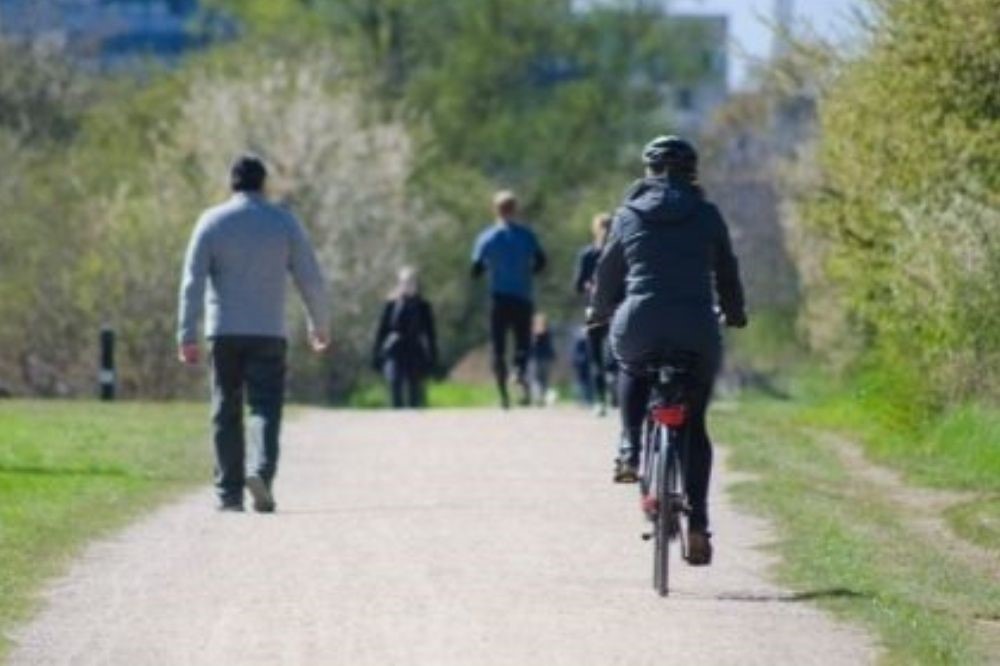When you can, meet virtually, take a train, or skip that long-distance trip altogether. Airplanes burn large amounts of fossil fuels, producing significant greenhouse gas emissions. That makes taking fewer flights one of the fastest ways to reduce your environmental impact.
Tip 1. Alternative Transport
- Use the bus and train whenever you can as the carbon cost is spread between more people. Book well in advance for the cheapest fares.
- When you can, walk or cycle to your destination. Not only will this benefit the environment but it will also improve your own fitness and general wellbeing.
- Alot of travel pollution happens during journeys of less than 5 miles – short journeys that could be made by foot or bike. By choosing to walk and cycle a journey rather than using a car you are also helping to reduce air pollution.
Tip 2. Travel Planning
- When possible travel at less traffic-heavy times of day as this can limit time spent in traffic jams which contributes to poor air quality and reduces fuel consumption.
- Plan your journeys: Can you combine them and, therefore, make less journeys?
- Avoid short journeys; a cold engine uses almost twice as much fuel, and catalytic converters can take five miles to become effective which adds to air pollution.
- When you can, share a car.
Tip 3. Fuel Saving
- Driving at 50 mph uses 25% less fuel than 70 mph.
- Accelerating and braking gently also helps. Anticipating road conditions and driving smoothly, avoiding sharp acceleration and heavy braking, saves both fuel and reduces accident rates.
- When you are in a queue of traffic and know you will not be moving for a few minutes turn off your engine. Switching off the engine rather than idling will cut fuel consumption and help to reduce air pollution.
- Accessories such as roof racks, bike carriers, and roof boxes, as well as open windows and low tyre pressure significantly affects your car’s aerodynamics and reduces fuel efficiency, so remember to remove them when not in use.
Tip 4. Electric Vehicles
- Use your current car until it needs replacing.
- If you can't manage without a car, change to hybrid or electric: UK electric cars emit 50% less carbon pollution than diesel engines. And because they're much cheaper to run the lifetime cost of a new electric car is no more than a normal car. More makes of electric cars are available and more are coming onto the market. Newer models can go over 250 miles on one charge, and faster charging stations are popping up
Tip 5. Air Travel
- Until petroleum-based aviation fuel is replaced you should avoid flying when possible, or fly less frequently, fly shorter distances, and fly economy class.
- Consider renting an electric car car or taking a train for half of your journey, and only fly the other half.
- Take more frequent “staycations” closer to home and fewer vacations that are far away.
- Try taking the train to make the journey part of the holiday adventure. There is increasing information on the Internet to help you plan a slow holiday.
- Economy class is best, for the same reasons as carpooling and public transportation: Each flyer’s share of a flight’s carbon emissions is relatively less because it’s spread out over more people.
FOR MORE INFORMATION
- Walking & Cycling: https://www.sustrans.org.uk/our-blog/get-active/2020/in-your-community/how-does-walking-and-cycling-help-to-protect-the-environment/
- For top advice on train travel abroad, visit The Man in Seat 61 . The UK has great places to go on holiday too.
- Holiday closer to home with these no-fly holiday ideas from Friends of the Earth
- Get more fuel-saving tips from the Environmental Transport Association
- Charging Points: Find out where charging points are in the UK: https://www.zap-map.com/live/
- Electric car advice: Get more advice on electric cars with the Energy Saving Trust

